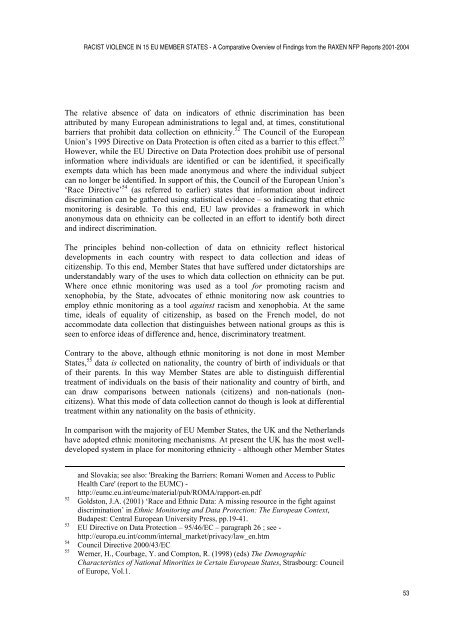RACIST VIOLENCE IN 15 EU MEMBER STATES - Cospe
RACIST VIOLENCE IN 15 EU MEMBER STATES - Cospe
RACIST VIOLENCE IN 15 EU MEMBER STATES - Cospe
You also want an ePaper? Increase the reach of your titles
YUMPU automatically turns print PDFs into web optimized ePapers that Google loves.
<strong>RACIST</strong> <strong>VIOLENCE</strong> <strong>IN</strong> <strong>15</strong> <strong>EU</strong> <strong>MEMBER</strong> <strong>STATES</strong> - A Comparative Overview of Findings from the RAXEN NFP Reports 2001-2004<br />
The relative absence of data on indicators of ethnic discrimination has been<br />
attributed by many European administrations to legal and, at times, constitutional<br />
barriers that prohibit data collection on ethnicity. 52 The Council of the European<br />
Union’s 1995 Directive on Data Protection is often cited as a barrier to this effect. 53<br />
However, while the <strong>EU</strong> Directive on Data Protection does prohibit use of personal<br />
information where individuals are identified or can be identified, it specifically<br />
exempts data which has been made anonymous and where the individual subject<br />
can no longer be identified. In support of this, the Council of the European Union’s<br />
‘Race Directive’ 54 (as referred to earlier) states that information about indirect<br />
discrimination can be gathered using statistical evidence – so indicating that ethnic<br />
monitoring is desirable. To this end, <strong>EU</strong> law provides a framework in which<br />
anonymous data on ethnicity can be collected in an effort to identify both direct<br />
and indirect discrimination.<br />
The principles behind non-collection of data on ethnicity reflect historical<br />
developments in each country with respect to data collection and ideas of<br />
citizenship. To this end, Member States that have suffered under dictatorships are<br />
understandably wary of the uses to which data collection on ethnicity can be put.<br />
Where once ethnic monitoring was used as a tool for promoting racism and<br />
xenophobia, by the State, advocates of ethnic monitoring now ask countries to<br />
employ ethnic monitoring as a tool against racism and xenophobia. At the same<br />
time, ideals of equality of citizenship, as based on the French model, do not<br />
accommodate data collection that distinguishes between national groups as this is<br />
seen to enforce ideas of difference and, hence, discriminatory treatment.<br />
Contrary to the above, although ethnic monitoring is not done in most Member<br />
States, 55 data is collected on nationality, the country of birth of individuals or that<br />
of their parents. In this way Member States are able to distinguish differential<br />
treatment of individuals on the basis of their nationality and country of birth, and<br />
can draw comparisons between nationals (citizens) and non-nationals (noncitizens).<br />
What this mode of data collection cannot do though is look at differential<br />
treatment within any nationality on the basis of ethnicity.<br />
In comparison with the majority of <strong>EU</strong> Member States, the UK and the Netherlands<br />
have adopted ethnic monitoring mechanisms. At present the UK has the most welldeveloped<br />
system in place for monitoring ethnicity - although other Member States<br />
52<br />
53<br />
54<br />
55<br />
and Slovakia; see also: 'Breaking the Barriers: Romani Women and Access to Public<br />
Health Care' (report to the <strong>EU</strong>MC) -<br />
http://eumc.eu.int/eumc/material/pub/ROMA/rapport-en.pdf<br />
Goldston, J.A. (2001) ‘Race and Ethnic Data: A missing resource in the fight against<br />
discrimination’ in Ethnic Monitoring and Data Protection: The European Context,<br />
Budapest: Central European University Press, pp.19-41.<br />
<strong>EU</strong> Directive on Data Protection – 95/46/EC – paragraph 26 ; see -<br />
http://europa.eu.int/comm/internal_market/privacy/law_en.htm<br />
Council Directive 2000/43/EC<br />
Werner, H., Courbage, Y. and Compton, R. (1998) (eds) The Demographic<br />
Characteristics of National Minorities in Certain European States, Strasbourg: Council<br />
of Europe, Vol.1.<br />
53
















